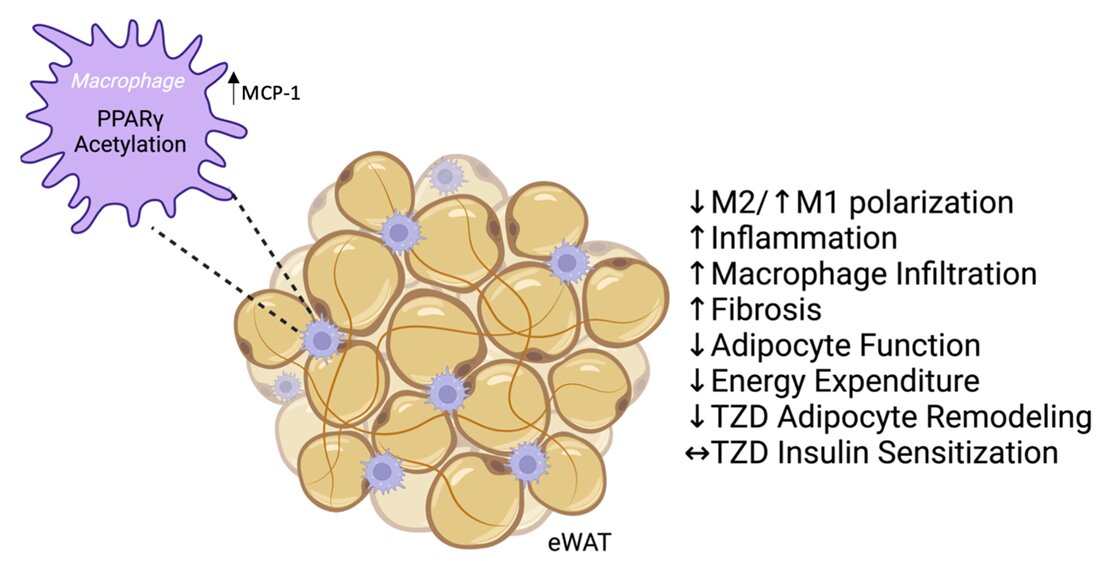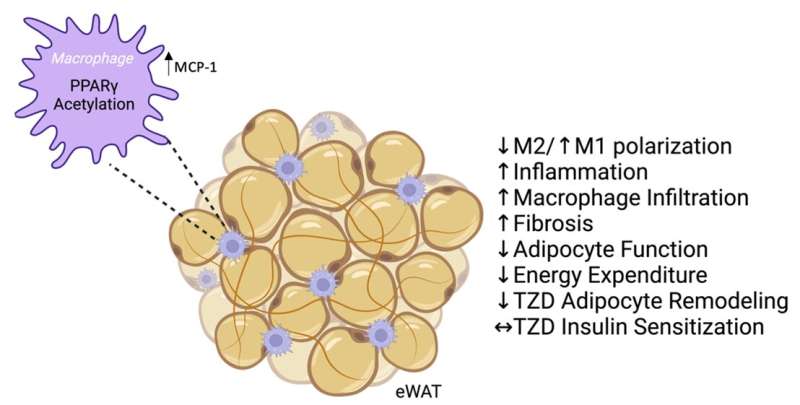

As a chronic pro-inflammatory disease, obesity is closely associated with the development of various diseases such as type 2 diabetes, cardiovascular disease and cancers. Obesity is now a major concern for public health.
Macrophages have been known to play an important role in the development of obesity. Recent studies have shown that adipose tissue-resident macrophages respond to the intake of fat, and regulate fat storage in a paracrine fashion. Macrophages are no longer just a “player,” but a “culprit” in the development of obesity.
A growing body of evidence indicates that the nuclear receptor peroxisome proliferation-activated receptor γ (PPARγ) plays a leading role in the development and remodeling of adipose tissue. On the one hand, PPARγ is highly expressed in adipocytes and acts as a major regulator of adipocyte differentiation and function. On the other hand, PPARγ plays anti-inflammatory roles in macrophages, and deletion of PPARγ in macrophages impairs lipid metabolism.
Although accumulating evidence showed close correlation among PPARγ, macrophages and lipid metabolism, how post-translational modifications of PPARγ in macrophages regulate adipose issue remains largely unknown.
In a recent study of Life Metabolism, the Li Qiang group at Columbia University revealed a novel role of PPARγ acetylation in macrophages in impairing adipose tissue function.
They constructed a mouse line that expresses a macrophage-specific, constitutive acetylation-mimetic form of PPARγ (K293Qflox/flox:LysMcre, mK293Q) to systematically analyze the role of PPARγ acetylation in macrophages both in vitro and in vivo. Under high-fat diet (HFD) conditions, mK293Q mice showed a significant increase in M1-like macrophage infiltration in epididymal white adipose tissue (eWAT), and a significant decrease in M2 polarization of macrophage, partially through Mcp1-mediated mechanisms. Metabolic and phenotypic analysis revealed that macrophage PPARγ acetylation decreased energy expenditure and exacerbated weight and fat accumulation during HFD, impairing insulin sensitivity and glucose tolerance.
Further testing of metabolic indicators in the plasma of mK293Q mice revealed decreased expression of Adiponectin and Adipsin, two key adipose-secreting factors regulating systemic insulin sensitivity and glucose homeostasis, and impaired expression of genes related to adipocyte function in eWAT, as well as an overall impairment of lipid metabolism. Notably, the adipose tissue of mK293Q mice showed severe fibrosis. Thus, PPARγ acetylation in macrophages promotes macrophage infiltration, causing adipose fibrosis and dysfunction and aggravating hepatic steatosis with HFD feeding.
PPARγ synthesis activator thiazolidinediones (TZDs) are an important class of anti-diabetic drugs which inhibit the inflammatory response of macrophages and alleviate adipose tissue inflammation in vivo. In this study, the TZD drug Rosiglitazone (Rosi) was used to treat mK293Q mice after HFD feeding.
The results showed that, although Rosi could to some extent rescue insulin resistance and impaired glucose tolerance in mK293Q mice, the response of eWAT to TZD drugs was compromised. Macrophage infiltration, the expression of inflammatory and anti-inflammatory factors, and the expression of adipocyte functional genes were not fully restored. In conclusion, PPARγ deacetylation in macrophages is critical for the remodeling and functional improvement of visceral adiposity in response to TZD.
Source: Read Full Article